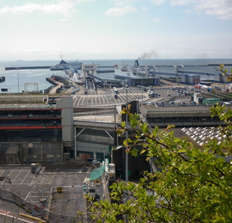Staff shortages and the requirement to prioritise passenger checks while managing queue times often prevent Border Force officers from doing other important duties, such as checking freight. That’s what Border Force officers told the National Audit Office, according to a NAO report last month on border security.
The Border Force separated from the UK Border Agency in March 2012 because the Home Office was not confident the Border Force was capable, as the NAO put it, of ‘responding to instructions’. Hence the Border Force has standardised how its officers check passengers, and almost all passengers at the border now receive full passport checks.
Auditors found shortcomings on IT. The NAO reported: “Front-line staff use a database called the Warnings Index to check all passengers’ passports and to ascertain whether the passengers should be detained or questioned by other agencies. The ‘Warnings Index’ went live in the early 1990s and was designed to have a seven-year life span. It is now unstable and at risk of collapsing. It also contains a great deal of out-of-date information, which can delay passenger processing if officers need to leave passport control to double-check entries.” For example, the index will detail somebody refused entry to the UK but not say whether they gained permission later. “We also found that information was being gathered without assessing what Border Force officers would find useful, and that the hub was not analysing information to detect whether trends were emerging in border security.”
The Border Force has reduced passenger queuing times at the border. In April 2012, just before the Olympics, as the NAO reports, it became clear that the Border Force was struggling to manage queue times. The Force introduced measures to deal with this and, in 2012-13, more than 99 per cent of passengers cleared passport controls within the target times of 25 minutes for European arrivals and 45 minutes for those arriving from outside Europe. In the first months of 2012-13, the Border Force was below target on some of its tasks, such as seizures of cigarettes and counterfeit goods, entry refusals and detecting forgeries. The Home Office’s internal auditors confirmed in April that the 2012 Olympics and ‘wider resourcing issues’ had an effect on the Force’s ability consistently to resource customs controls.
The workforce lacks identity. The Force consists largely of officers who used to work in customs or immigrations agencies, who typically still call themselves ‘ex-customs’ or ‘ex-immigration’. Five director-generals have been in post over the course of 18 months.
To meet the demands the Home Office has placed on it, such as carrying out full checks on all passengers rather than risk-based checks, the Border Force is recruiting more staff. Despite this, NAO visits revealed continuing staff shortages at the border. The Border Force has not established whether it has the resources it needs to deliver all its objectives.
The auditors say that the Force needs to deploy staff flexibly to respond to its competing demands, but is prevented from doing this as efficiently as possible because almost a fifth of its workforce is employed under terms and conditions that restrict working hours to fixed periods of the week. At Heathrow in spring 2013, less than half the workforce was contractually obliged to work before 5am without being paid additional benefits in kind, despite a significant number of long-distance flights arriving at that time. Those Border Force officers who were initially employed by separate customs and immigration organisations have different pay scales and work under different contractual terms and conditions, which are protected under Cabinet Office guidelines on staff transfers within the public sector.
What they say
Amyas Morse, head of the NAO, said: “The Department has placed greater demands on the Border Force, which has successfully implemented full passenger checks and reduced queuing times. It has achieved this progress by focusing on a subset of its full range of responsibilities. The Border Force now needs to show it can apply the lessons learned from its successes to date across its full range of activities to ensure the security of the border. The Department needs to fund it to do so.” Immigration Minister Conservative MP Mark Harper said that the Coalition ‘inherited an organisation with significant challenges’. He said: “The UK operates one of the most secure borders in the world and I am pleased the National Audit Office recognises the success of Border Force in implementing full passenger checks while also reducing queue times.”
While admitting that some of the challenges remain, he said that he was confident that under the long term leadership of the new Director General, Sir Charles Montgomery, Border Force will continue to build on its many areas of excellence. “We have recruited more Border Force staff; established command centres to deploy those staff more flexibly and effectively; and are reforming working practices.”









